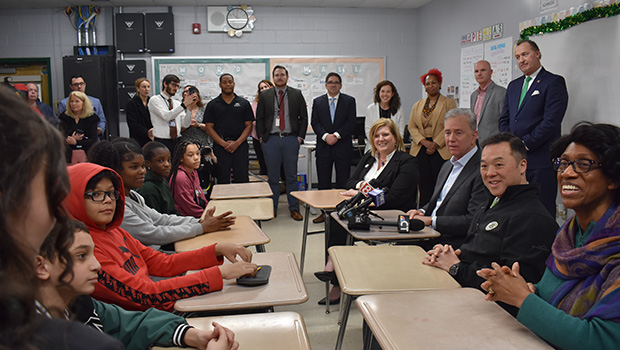Calling for a statewide policy to limit children’s cell phone use in school, Governor Lamont told students, “I want you to start your day listening to your teacher and playing with your friends, not your phone.”
Following on that policy recommendation, CEA President Kate Dias—together with Attorney General William Tong and Education Commissioner Charlene Russell Tucker—participated in a governor’s roundtable discussion today looking at the benefits and potential challenges that come with such a plan. The discussion took place at Manchester’s Illing Middle School, where Dias taught prior to moving to the high school.
Put a lock on it
Illing has piloted a program to restrict students’ cell phone access through the use of phone-locking pouches. Cell phones remain with students throughout the day but are secured in magnetically sealed pouches that can be unsealed only outside of phone-free zones, using unlocking bases. Students who wish to forgo the pouches must keep their phones at home or out of sight—for example, in their backpacks—for the duration of the school day.
“Phones can be a distraction, and they can get in the way of learning and motivation,” said Dias. “We’ve learned over time that restricting children’s cell phone access, particularly during the school day, makes a lot of sense.”

Illing Middle School science teacher John Burkhardt tells reporters about the positive change in student engagement since cell phone restrictions were put into place.
“Since we piloted this program,” said Illing science teacher John Burkhardt, “our students are more engaged and less distracted.”
Indeed, teachers, school counselors, and administrators report that the pilot program has resulted in significantly fewer disruptions, greater student engagement in learning, more frequent social interactions with peers in classrooms, hallways, the cafeteria, and other shared spaces, and a more positive school climate—observations borne out by data and by students themselves.
When Dias asked whether students felt disconnected or missed their phones during the school day, Illing’s seventh- and eighth-graders gave a resounding “no.” They also shared that the new policy has not only improved their academic performance, made it easier to do their classwork, and eliminated distractions but also made it easier to connect with their teachers and with one another.
“Students are chatting and building community together,” one teacher reported. “They are much better behaved.”
An overwhelming 96.4% of Illing Middle School teachers report that phones are no longer a distraction in class, nearly 86% report no behavioral issues related to phones, and school counselors have seen a decline in peer conflicts and the need for mediation related to social media posts.

CEA President Kate Dias asks students to describe their school experience when cell phones are taken out of the equation.
Torrington Middle School, which has also instituted a phone-locking pouch system, has reported similar results, including an immediate, steep decline in student violence and altercations.
“This isn’t about penalizing students, but freeing them,” said Dias.
Free to teach and learn
In schools where cell phones are not restricted, teachers spend considerable time and energy redirecting students. A statewide policy regarding cell phone access in schools—one that districts could tailor to meet their own needs—would go a long way toward easing that burden.
“When I’m teaching math, I’m competing against TikTok, Snapchat, music, and more,” Manchester High School teacher James Tierinni noted in a recent WFSB Channel 3 interview he gave with Dias. “These pouches are a great idea, because you’re taking something off teachers’ plates so that they can focus on what they’re really good at, which is teaching. Pouches also take something off students’ plates, so they’re not having to think about whether their phone is buzzing or if they should check it; it allows them to focus on their learning. When students are focused, you get the best out of them.”
Although some families in Manchester and Torrington were initially apprehensive about restricting children’s access to their cell phones—a worry shared by students as well—those concerns have largely been allayed. Classroom and school office phones allow for timely communication about school issues, building security, and more.
“I don’t need my phone in class,” one Illing student explained. “My teachers have my back.”







